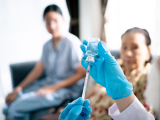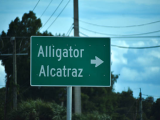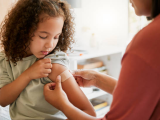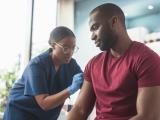Sep 10, 2009 (CIDRAP News) – Preliminary clinical trial results suggest that pandemic H1N1 vaccines made by Novartis and CSL Ltd. will provide protection in adults with just one dose, raising hope for a less difficult immunization program than has been anticipated.
Preliminary results for the two vaccines were published online this afternoon by the New England Journal of Medicine. The US Department of Health and Human Services (HHS) has ordered supplies of both vaccines, along with doses from three other companies.
Federal officials have said they expected that a two-dose regimen of the H1N1 vaccines would probably be necessary to generate an adequate immune response to the novel virus. The first doses are expected to become available in mid October.
In an editorial accompanying the vaccine reports, infectious disease expert Kathleen M. Neuzil, MD, MPH, called the findings welcome and reassuring.
She noted that a one-dose schedule doubles the number of people who can be protected with a given amount of vaccine, and it also means that vaccinees are protected sooner, since a two-dose regimen typically involves doses spaced 3 weeks or more apart.
"On the basis of these data, it would be appropriate to begin vaccination with the use of one dose of the usual antigen content," Neuzil wrote. "In children, two doses may be needed, but vaccine should not be held in reserve to be used for a second dose."
British researchers tested the Novartis vaccine in a complex trial involving various doses formulated with or without the company's proprietary adjuvant, MF59. The report is an interim analysis of responses to 7.5 micrograms (mcg) of adjuvanted vaccine after 14 and 21 days in 100 volunteers. The volunteers were between the ages of 18 and 50.
By 21 days after vaccination with one 7.5-mcg dose of adjuvanted vaccine, 76% and 92% of volunteers showed a potentially protective immune response as measured, respectively, by hemagglutination inhibition and microneutralization assays, according to the report.
Some of the volunteers received a second 7.5-mcg dose 7 or 14 days after the first. By day 21, those subjects had immune-response rates ranging from 88% to 92% and 92% to 96%, as measured by the two different methods.
"Although two doses (for a total of 15 mcg of [hemagglutinin]) yield higher antibody levels than one dose, the seroprotective titer was attained in at least 80% of subjects in every group," Neuzil wrote in commenting on the Novartis study.
However, she added that with no data yet on the response in those who received non-adjuvanted doses, it's not possible to assess the contribution of the adjuvant. HHS has ordered supplies of two adjuvants, but no adjuvanted flu vaccine has ever been used in the United States.
As for safety, 70% of the Novartis trial volunteers reported pain at the injection site and 42% had muscle aches, the report says. Two of the vaccinees had a fever after the first dose.
The CSL trial, conducted by company researchers in Australia, involved 240 adults, divided into two groups by age: under 50 and 50 and older. In each group, volunteers received either 15 mcg or 30 mcg of antigen.
By 21 days after vaccination, an immune response (an antibody titer of 1:40 or more) was observed in 116 of 120 volunteers (97%) who received 15 mcg and in 112 of 120 (93%) who received 30 mcg.
The report says 46% of the volunteers reported injection-site tenderness or pain, while 45% had systemic symptoms such as headache. Nearly all the problems were described as mild to moderate, and there were no serious adverse events.
"These results are welcome and reassuring, as there is little evidence of cross-reactive antibody against the novel 2009 pandemic influenza A (H1N1) virus in the general population, and the need for two doses had been predicted," Neuzil commented in her editorial.
But without a non-vaccinated control group, it's not possible to know whether any of the volunteers had a subclinical H1N1 infection that boosted their response to the vaccine, she added. The virus was circulating in Australia as the trial was being conducted, she noted.
She also noted that children's responses to the H1N1 vaccines remain to be seen.
On the safety side, Neuzil said both vaccines have "generally acceptable" side-effect and adverse-event profiles, though the local reactions to the adjuvanted vaccine were somewhat higher than those generally seen with nonadjuvanted doses. The trials were not large enough to reveal rare adverse events, she added.
HHS officials have ordered a total of 195 million doses of H1N1 vaccine from five manufacturers. Federal officials have said that Novartis will contribute about 45% of that supply and CSL about 19%.
Other companies with H1N1 vaccine orders from HHS are Sanofi Pasteur, GlaxoSmithKline, and MedImmune.
Greenberg ME, Lai MH, Hartel GF, et al. Response after one dose of a monovalent influenza A (H1N1) 2009 vaccine--preliminary report. N Engl J Med 2009 (published online Sep 10) [Full text]
Clark TW, Pareek M, Hoschler K, et al. Trial of influenza A (H1N1) 2009 monovalent MF59-adjuvanted vaccine--preliminary report. N Engl J Med 2009 (published online Sep 10) [Full text]
Neuzil KM. Pandemic influenza vaccine policy--considering the early evidence. (Editorial) N Engl J Med 2009 (published online Sep 10) [Full text]


















